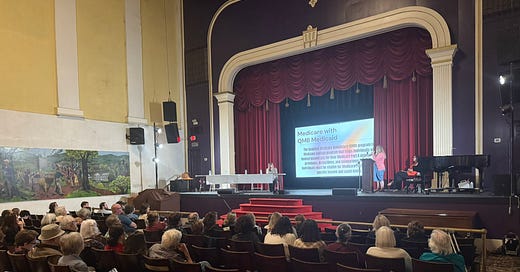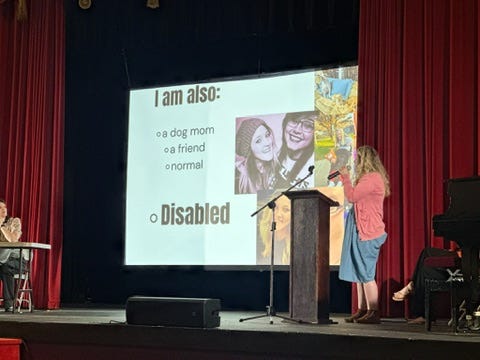by Angie Hood
The Progressive Women’s Action Coalition of Dekalb County held a town hall meeting on April 22nd with the aim of educating the community about Medicaid. Medicaid is an essential health coverage program, and potential cuts could jeopardize the ability of millions of Americans to access necessary healthcare services. Recognizing the urgency of addressing these concerns and fostering public engagement, the coalition organized the Medicaid Town Hall meeting. This article explores the major points discussed during the event and considers the potential impact of proposed legislation on these programs.
Objectives of the Medicaid Town Hall
The primary goal of the Medicaid town hall was to create a platform for open dialogue between community members, healthcare providers, and policymakers. The town hall aimed to:
Educate the public about Medicaid and its benefits
Address concerns and misconceptions about the program
Gather feedback to inform future policy decisions
Encourage community involvement in healthcare advocacy
Presentations
Debbie Smith, the Cover Alabama Campaign Director for Alabama Arise, discussed the potential impact of cuts on Alabamians. Over one million children, nursing home residents, individuals with breast and cervical cancer, people with disabilities, pregnant women, and caregivers are at substantial risk if cuts occur. Medicaid provides essential services such as prescription drugs, inpatient and outpatient hospital services, labs, therapy services, and screenings. It is a vital lifeline for Alabama residents, and cuts could lead to closure of hospitals, long-term care facilities, and day programs for adults with disabilities.
Angel Garrett delivered a compelling message about the significance of Medicaid in her life as a person with a disability and the potential consequences of Medicaid cuts. She highlighted that Medicaid is an essential program for individuals like her, saying, "I couldn't survive without this program." Medicaid coverage enables Angel to live in her community with the necessary support to lead a normal life as a young woman with a disability. Additionally, as an advocate for the governor's office in Alabama, she is striving to help people understand the real-life implications of cutting Medicaid. Her voice is one of many that needs to be acknowledged.
Meet The Panel
Local pharmacist Matthew Taheri described how he has seen patients rationing essential medications due to financial constraints. Dr. Jason Ham highlighted the other side of the issue, noting that he has seen patients who are not receiving crucial medications, such as those for diabetes, leading to severe health complications like diabetic ketoacidosis (DKA). Both professionals emphasized the detrimental impact on quality care when patients cannot access vital prescription medications and follow-up care. Both agreed that cuts in Medicaid would make obtaining both prescription and medical services harder than it already is today.
Ashlie Combs, MS, a dedicated counselor and advocate for mental health and disability, shared her story from both personal and professional perspectives. She talked about the harsh reality of falling into the Medicaid eligibility gap and its effect on individuals needing mental health care and their caregivers. Ashlie spoke about her own challenges as a mother of children with disabilities, a veteran who has served her country, and a counselor working within her community. Despite her efforts, she struggles with the lack of coverage, even for essential items like incontinence products for her child.
Professionally, Ashlie serves a community where approximately 75% of her patients are on Medicaid. She expressed concern over potential cuts to services that are vital for mental health care, such as interventions for intellectual disabilities, and crucial programs like the ARC, group homes, transportation, and companion services. These programs are indispensable for helping both children and adults achieve their best potential and lead fulfilling lives within the community.
Conclusion
The Medicaid town hall provided a platform for community members to express their concerns, share their personal stories, and engage in the discourse about healthcare coverage. By addressing the highlighted issues and considering what the proposed cuts could mean to citizens, policymakers can aim for a more comprehensive and effective Medicaid program. The active participation and advocacy from the community are crucial in driving the necessary changes for improved health coverage for everyone. Attendees were urged to contact their legislators to express concerns about potential reductions to this crucial lifeline for many Alabama residents. The entire Town Hall is available for viewing on the Progressive Women's Action Coalition's Facebook page.







